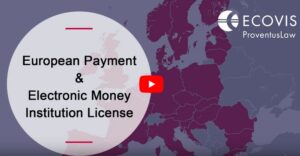Electronic Money Institution. Digital Payments and Payment Cards
Neo – Bank with all payment services. Direct SEPA connection. Payment cards acquiring and issuing. Equity capital – EUR 350 000.
Licensed Electronic Money (EMI) Institution allows provision of all payment services in much wider range comparing with Payment Institution designed for instant payment processing. EMI can hold client funds for the unlimited period of timed in opened individual client IBAN accounts. EMI’s licensed in one European Union (EU) member state opens up business opportunities to act and provide services in all other EU/EEA countries, enjoying the benefits of a Common Market without any restrictions and additional requirements.
Difference between Payment and Electronic Money Institution
Electronic Money (E-money) defined by European Central Bank as an electronic store of monetary value on a technical device that may be widely used for making payments to entities other than the e-money issuer. The device acts as a prepaid bearer instrument, which does not necessarily involve bank accounts in transactions. Directive 2009/110/EC established legal basis for e-money issuing in the European Union (EU).
The practical difference between Electronic Money (E-money) and Payment Institution (PI) is that E-money institutions in addition to the services provided by PI are entitled to issue Electronic Money. It means that Electronic Money Institutions allowed storing clients’ funds for a longer period what Payment Institutions usually not allowed. E-money license allows the issue of payment cards, e-wallets, and other payment instruments requiring storage of the client funds.
After the UK left EU Lithuania became the No.1 European jurisdiction having the biggest number of issued Payment and Electronic Money Institutions licenses.
Reasons why Lithuania is the top jurisdictions for E-money institution licensing:
- No particular requirement for company directors and board members to reside in Lithuania/Europe.
- Application for a license submitted without establishing a company and freezing up capital.
- Fast licensing process.
- Licensing documentation can be submitted in English.
- Possibility to provide individual client IBAN accounts. Lookup for the IBAN account according to the alternate identifier: mobile phone number (MSISDN) and Email (URI).
- Direct access to the Single Euros Payment Area (SEPA) through the CENTROlink payment system managed by the Bank of Lithuania (Central Bank).
- Possibility to safeguard client funds in the accounts of the Bank of Lithuania (Central Bank of EU member state).
- PSD2 implementation allowing Payment Initiation Service (PIS) and Account Information Service (AIS).
- Remote client verification. Innovative “know your customer” processes for remote client verification allows open the accounts without the physical presence of the client.
- License allows provision of the financial services in all EU/EEA area without any additional licensing.
- Regulatory “Sandbox”.
- Start-up visa. Special visas for citizens of non-EU/EEA countries running innovative businesses in Lithuania.
Services provided by Electronic Money Institution
Electronic Money Institution license is the right decision for the payment service providers planning a wider range of services than just instant payment processing.
- Services enabling cash to be placed on a payment account.
- Services enabling cash withdrawals from a payment account.
- Execution of payment transactions, including transfers of funds on a payment account with the payment service provider of the payment service user or with another payment service provider: execution of direct debits, including one-off direct debits, execution of payment transactions through a payment card or a similar device and/or execution of credit transfers, including standing orders.
- Execution of payment transactions where the funds are covered by a credit line for a payment service user: execution of direct debits, including one-off direct debits, execution of payment transactions through a payment card or a similar device and/or execution of credit transfers, including standing orders.
- Issuing and/or acquiring of payment instruments.
- Money transfers.
- Payment Initiation Service (PSD2 implementation).
- Account Information Service (PSD2 implementation).
- Issuing of Electronic Money.
Lithuania has already implemented the EU Second Payment Services Directive (PSD2) allowing Payment Initiation Service (PIS) – initiation of a payment order from the client bank account at the request of the client from the payment account held at another payment service provider (bank). PSD 2 also allows E-money Institution to provide Account Information Service (AIS) accessing consolidated information from the client accounts held by other payment service providers (banks) and have an overall view of client financial information.
Direct SEPA connection through the CENTROlink system managed by the Bank of Lithuania
Direct SEPA connection through CENTROlink system managed by the Central bank for SEPA Credit Transfers, Instant payments, and Direct Debits at low cost. SEPA Credit Transfer (SCT) and SCT Inst fees – EUR 0.01 – 0.024. SEPA Direct Debit (SDD) fees – EUR 0.08.
ECOVIS experience in financial institution licensing and compliance
Being part of ECOVIS International consulting network present in more than 80 counties around the world ECOVIS ProventusLaw currently considered as the most experienced financial advisor in Lithuania. ECOVIS licensed in Lithuania more than 30 Payment and Electronic Money institutions including the names such as Instarem (Currently Nium) and Contis Group. ECOVIS ProventusLaw provides all the services you may need launching busines, including preparation of licensing documentation, representation at the Bank of Lithuania during the licensing procedure, company incorporation, office registration, advice on IT, HR, compliance, and other issues arising during the incorporation of payment business in Europe. After the licensing procedure completed, ECOVIS offers accounting, reporting, audit, compliance, and legal services for the operational business.
More information Payment Institution license
Bank / Specialised Bank license



